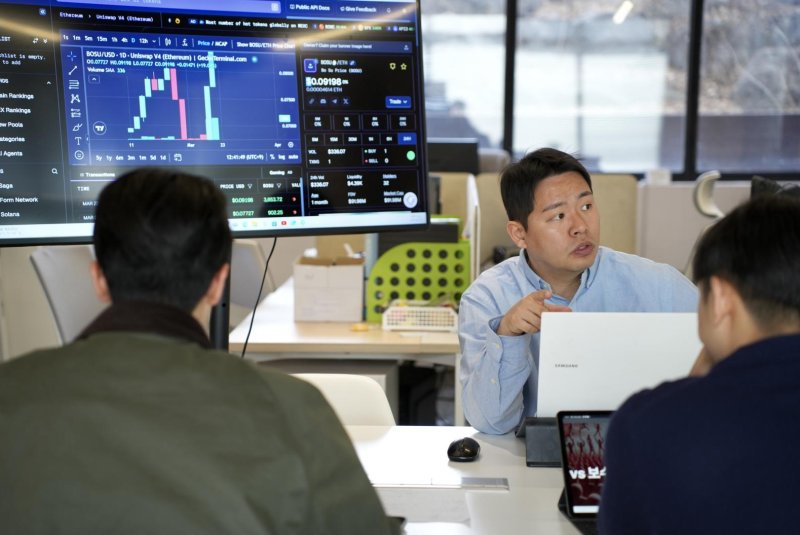DYC’s founding CEO Lee Da-yeon has a meeting at the company’s office in Seoul. The company rolled out unique political meme coins earlier this year. Photo courtesy of DYC
SEOUL, April 2 (UPI) — A South Korean company has launched a pair of political meme coins which it claims offer an accurate real-time reflection of the country’s public sentiment amid the divisive impeachment trial of its president.
Seoul-based DYC introduced the Progressive (Jin Bo) and Conservative (Bo Su) coins in February. Both are currently traded on UNISWAP, a decentralized cryptocurrency exchange.
DYC’s founding CEO Lee Da-yeon said that the tokens would outperform conventional opinion polls, which often suffer from biased phrasing and low response rates, in gauging shifts in public sentiment.
“The value of Bo Su or Jin Bo coins is determined by open-market demand. When significant political or social events occur, coin price fluctuations provide a real-time indicator of public sentiment across ideological lines,” Lee told UPI.
“Unlike traditional polls that require time to collect and analyze responses, this market-based system reflects opinion shifts immediately and continuously, creating a more responsive feedback mechanism,” he said.
Thus far, the Progressive coin has done better in the two-way competition as it has been traded at a higher value than the Conservative coin.
Lee interprets this as a sign of the public’s political leaning during a period of deep uncertainty in the East Asian country.
“Most of our current users appear to be Koreans because our outreach focused only on the domestic market over the past few months,” he said. “In my view, the stronger demand for the Progressive coin suggests that more Korean people want progressive solutions in today’s tumultuous political situation.”
In early December, President Yoon Suk Yeol declared a brief martial law, prompting the National Assembly to impeach him. The Constitutional Court is reviewing the case to deliver its verdict this Friday.
If the court upholds the parliamentary impeachment, Yoon will be removed from office, triggering a presidential election within 60 days. Most opinion polls have found that a majority of people back Yoon’s removal.
Asked about the possibility that the generation gap in familiarity with cryptocurrency technology can kick in, Lee acknowledged that older, more conservative citizens might struggle to access platforms like UNISWAP, potentially skewing participation.
“We are working hard to list the coins on major exchanges to make them more accessible, which will improve their reliability as political indicators,” he said.
Lee claimed that using real money would add weight to participants’ decisions.
“When people put real money behind their predictions, they tend to make more careful, rational decisions, unlike emotional or superficial survey responses. The aggregate of those financially motivated decisions often reveals a more truthful picture of public sentiment,” he said.
Ultimately, Lee hopes to build a blockchain-based political engagement model as a platform designed to become a trusted public resource.
“This model would generate tamper-proof political data, foster open and fair communities, and eventually influence elections and policymaking as a core part of digital democracy,” he said.
“We envision a future where real-time, tamper-proof civic data influences public discourse, policy feedback, and even voting behavior. It’s a new form of digital democracy where participation is voluntary, transparent, and meaningful,” Lee added.
